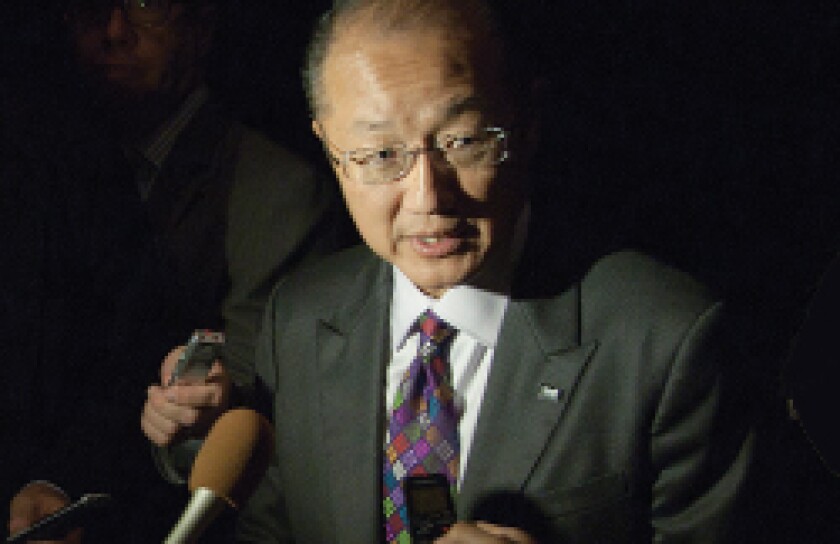The head of the World Bank last night issued a direct appeal to US lawmakers to act now to prevent a default on American debt that he warned would have a “devastating impact” on poor people across the world.
Jim Yong Kim, the Bank’s President, told Emerging Markets that failure to resolve the political crisis by the end of this weekend would almost certainly trigger a major market reaction. “We have set in motion a several month impact and the markets will just fall.”
“We are urging US legislators to think hard about how much that global impact is going to mean, not just to people here [in the US], not just to people in developing countries but for the future of the American economy.
“If you have this devastating impact on the developing world it will come back and be felt right in the pocket books of Americans. All this is to say—please, please resolve this quickly.”
He said developing countries were also sending a clear message. “Borrowing costs are already going up and if you look throughout the developing world, everyone is talking to me saying they need access to long-term capital.
“Just getting close to it happening will have huge implications,” he said. “If we go over the cliff and the US actually defaults, everyone feels that that the effects will be severe.”
He said that based on the experience of the 2011 fiscal crisis when US Treasury yields soared by 75 basis points and stock markets posted a substantial fall, it was clear the world economy already was “at the point where there are going to be measurable negative effects”.
He warned that as well as pushing up borrowing costs, the crisis would lead to a slump in confidence and a rush to safe havens that could trigger currency devaluations across developing economies. “It’s going to be a disaster if we get that far,” he said.
Kim also used the interview to urge ministers to back his strategy for a sweeping reorganization of the multilateral lender that he said would deliver real improvements on the ground and safeguard the future of the Bank.
The development committee on Saturday is expected to approve Kim’s 50-page strategy that will see the creation of 14 “global practices” cutting across different projects and countries and budget cuts of $400 million or 8% over three years.
The meeting will also endorse Kim’s targets to eradicate poverty by 2030 and foster income growth for the bottom 40% of the population in every country – both of which have been criticized as too weak by NGOs.
Kim responded yesterday by setting a new target to cut poverty to 9% from 18% by 2020, making it the first time it has fallen below single digits. “Now we are talking about cutting poverty in half in seven years,” he told Emerging Markets. “That’s a huge job.”
He admitted he would not have been able to get backing for explicit targets to reduce, rather than just monitor, inequality. “Frankly that would have been very difficult to get 188 countries to agree on. I think this is the closest and most effective proxy for looking at the status of inequality in any given country.”
He said his strategy was not a reversal of the decentralization ordered by then-President Jim Wolfensohn in the 1990s reorganization. He said new technology meant Bank staff based in countries around the world could be part of a global practice in a way that was impossible two decades ago.
“You could be someone working in health in Liberia and have access to every new health innovation instantaneously,” he said, adding that country staff had told him they currently spent less than 1% of their time helping other regions.
He said his reforms would secure the Bank’s future in an increasingly crowded development arena. “We are going to be the best in the world at bringing global knowledge to a local context,” he said. “No one combines knowledge with real money and real projects.”
